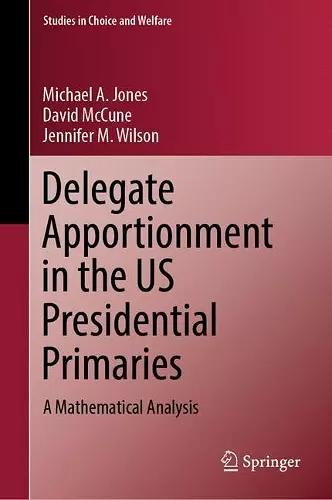Delegate Apportionment in the US Presidential Primaries
A Mathematical Analysis
David McCune author Jennifer M Wilson author Michael A Jones author
Format:Hardback
Publisher:Springer International Publishing AG
Published:19th Mar '23
Currently unavailable, and unfortunately no date known when it will be back

This book provides a comprehensive mathematical description and analysis of the delegate allocation processes in the US Democratic and Republican presidential primaries, focusing on the role of apportionment methods and the effect of thresholds—the minimum levels of support required to receive delegates. The analysis involves a variety of techniques, including theoretical arguments, simplicial geometry, Monte Carlo simulation, and examination of presidential primary data from 2004 to 2020.
The book is divided into two parts: Part I defines the classical apportionment problem and explains how the implementation and goals of delegate apportionment differ from those of apportionment for state representation in the US House of Representatives and for party representation in legislatures based on proportional representation. The authors then describe how delegates are assigned to states and congressional districts and formally define the delegate apportionment methods usedin each state by the two major parties to allocate delegates to presidential candidates.
Part II analyzes and compares the apportionment methods introduced in Part I based on their level of bias and adherence to various notions of proportionality. It explores how often the methods satisfy the quota condition and quantifies their biases in favor or against the strongest and weakest candidates. Because the methods are quota-based, they are susceptible to classical paradoxes like the Alabama and population paradoxes. They also suffer from other paradoxes that are more relevant in the context of delegate apportionment such as the elimination and aggregation paradoxes. The book evaluates the extent to which each method is susceptible to each paradox. Finally, it discusses the appointment of delegates based on divisor methods and notions of regressive proportionality.
This book appeals to scholars and students interested in mathematical economics and political science, with an emphasis on apportionment and social choice theory.
“This interesting book demonstrates the application of mathematics to the apportionment problem, especially as used in the US presidential primary. The mathematical analysis is excellent, comprehensive and supported with real data, making this book an important and must-read reference for people who are interested in US politics, especially the application of apportionment methods. The authors indeed show a passion and expertise in writing this book and all deserve credit for a great job.” (Dharma Lesmono, Mathematical Reviews, May, 2024)
ISBN: 9783031249532
Dimensions: unknown
Weight: unknown
215 pages
2023 ed.